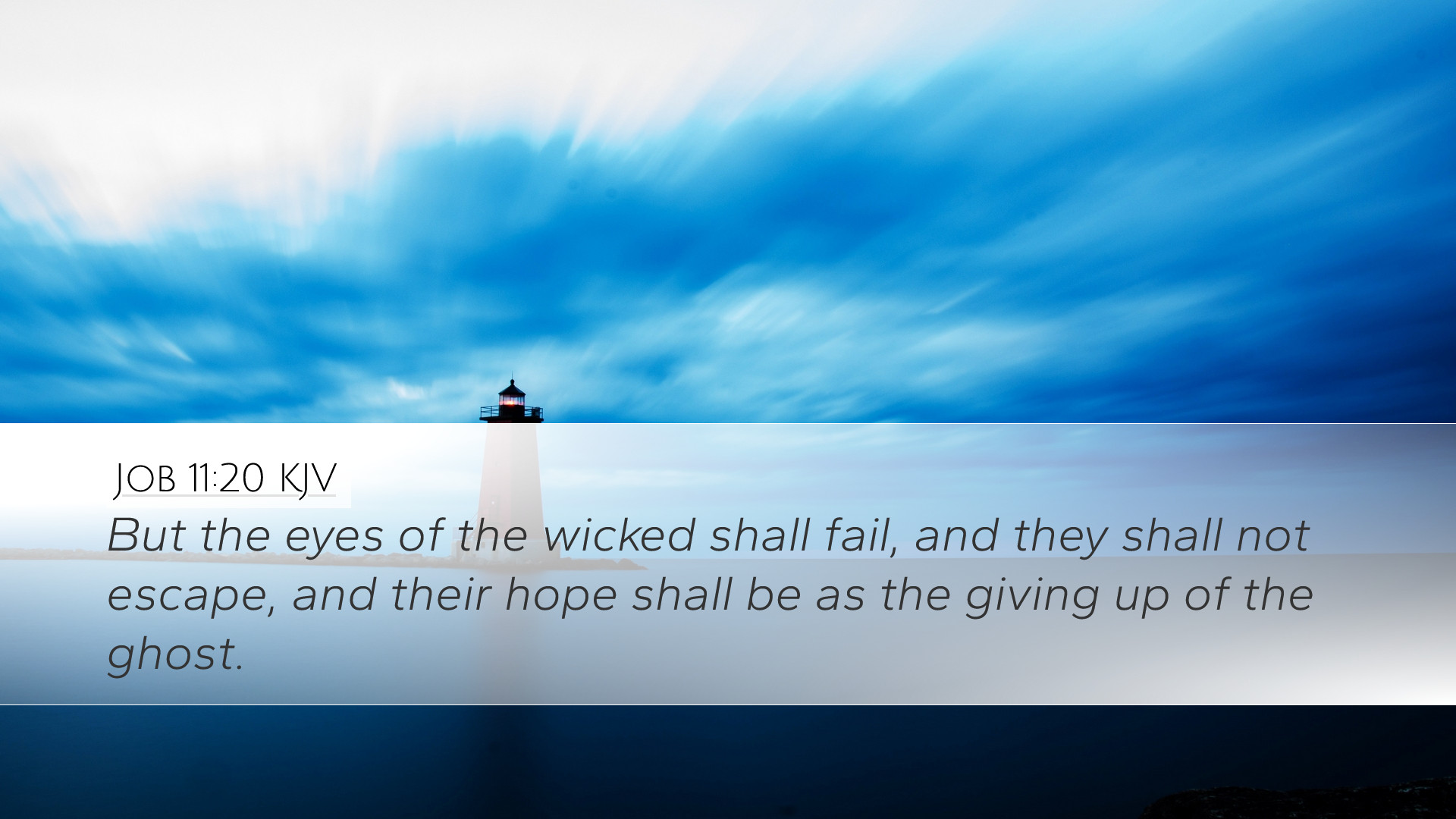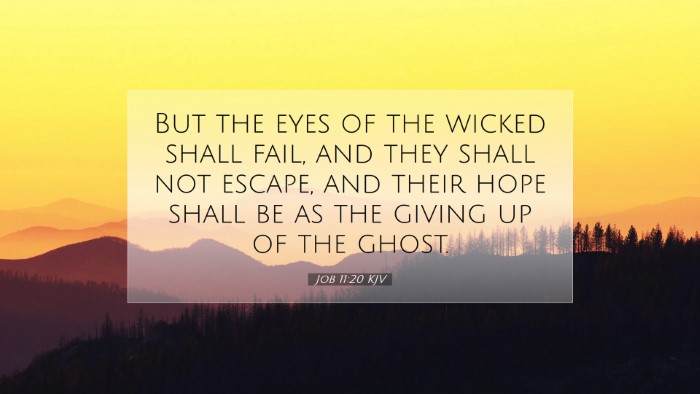Old Testament
Genesis Exodus Leviticus Numbers Deuteronomy Joshua Judges Ruth 1 Samuel 2 Samuel 1 Kings 2 Kings 1 Chronicles 2 Chronicles Ezra Nehemiah Esther Job Psalms Proverbs Ecclesiastes Song of Solomon Isaiah Jeremiah Lamentations Ezekiel Daniel Hosea Joel Amos Obadiah Jonah Micah Nahum Habakkuk Zephaniah Haggai Zechariah MalachiJob 11:20
Job 11:20 KJV
But the eyes of the wicked shall fail, and they shall not escape, and their hope shall be as the giving up of the ghost.
Job 11:20 Bible Commentary
Commentary on Job 11:20
The verse Job 11:20 states, "But the eyes of the wicked will fail; and they shall not escape, and their hope shall be as the giving up of the ghost." This passage is rich with theological insight and provides deep reflections on the nature of hope and despair, especially in the context of suffering and divine justice.
Contextual Background
The book of Job presents a profound exploration of human suffering and the complexities of divine justice. Within this frame, Job's friends seek to provide explanations for Job's suffering according to their understanding of retributive justice. Eliphaz, Bildad, and Zophar, the three friends of Job, each provide different perspectives on why Job experiences such intense trials.
Insights from Matthew Henry
Matthew Henry observes that in this verse, Zophar speaks with a harsh truthfulness that underscores the serious plight of the wicked. He highlights the inevitability of divine judgment, where the wickedness leads to a certain loss of hope. Henry emphasizes that the eyes of the wicked will fail signifies a loss of vision to see goodness and divine grace, leading to despair.
- Eyes of the wicked: This phrase suggests a spiritual blindness wherein the wicked cannot perceive their own fate or the mercies of God.
- Hope compared to the giving up of the ghost: Henry interprets this metaphor as a profound loss; just as death signifies the end of life's hopes and dreams, so too does the fate of the wicked lead to the extinguishing of hope.
Insights from Albert Barnes
Albert Barnes provides an interpretation that gives insight into the theological implications of this statement. He points out that Zophar’s assertion reflects the belief that those who live without righteousness eventually meet with sorrow and destruction.
- Failure of the eyes: Barnes indicates that the failure of the eyes of the wicked symbolizes their inability to foresee their doom, which speaks to the broader concept of moral blindness prevalent among the wicked.
- Escaping judgment: Barnes asserts that any hope for the wicked's escape from the consequences of their actions is ultimately futile, thereby reinforcing the biblical principle that God will not overlook sin.
Insights from Adam Clarke
Adam Clarke offers another perspective on this verse by emphasizing the despair that accompanies a life devoid of righteousness. He notes that such lives often end in ruin, suggesting that despair is not only a result of external circumstances but also stems from the internal moral state of the individual.
- Despairing hope: Clarke elaborates that the hope of the wicked is inherently unstable, akin to an earlier life that dissipates at death. When the wicked face ultimate judgment, their prior hopes collapse.
- Theological implications: Clarke reminds readers that this verse emphasizes the stark reality of divine justice, where outcomes align not just with actions but also with the moral and spiritual conditions of the heart.
Thematic Reflections
Theologically, Job 11:20 invites readers to reflect on several critical themes:
- Hope and Despair: The verse warns against placing hope in anything apart from God, especially for those who act wickedly, reminding us that true hope is anchored in righteousness.
- Divine Justice: The text reinforces the belief that God governs the world with justice, and while it may not appear immediate, the ultimate outcomes will reflect divine righteousness.
- Spiritual Blindness: The imagery of the failing eyes serves as a sober reminder of the spiritual blindness that accompanies wickedness, leading people away from truth and towards destruction.
Applications for Pastors and Theologians
For pastors and theologians, Job 11:20 can serve as a somber reminder of the importance of teaching righteousness and the consequences of sin. It provides a foundation for preaching the need for repentance and the message of hope found in Christ. The stark realities presented in the verse can encourage a compassionate approach towards the lost, highlighting the urgency of imparting the gospel, which offers true hope contrary to the despair described.


